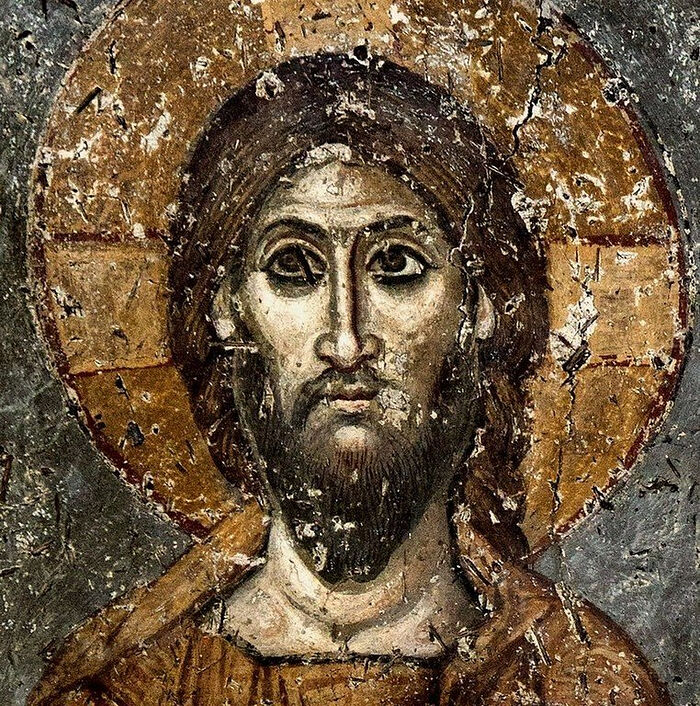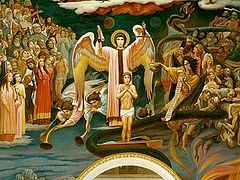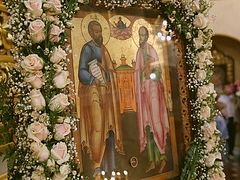 The Last Judgment. Fresco of the Church of Panagia Chalkeon in Thessaloniki, Greece. C. 1028 AD. Photo: fotoload.ru
The Last Judgment. Fresco of the Church of Panagia Chalkeon in Thessaloniki, Greece. C. 1028 AD. Photo: fotoload.ru
Yesterday we prayed for the memory of all our fathers and brethren who have reposed throughout the ages; and now we are translated in thought to the future and we place ourselves together with them before the throne of the awesome Judge, Who will decide the eternal fate of each of us.
Based on this, if there’s any day that’s appropriate for us to reflect on our life, examine our conscience, and weep for our sins, it’s today. For is it possible to think about the Dread Judgment of God and not at the same time appeal to your conscience? Is it possible to turn to our conscience and not immediately notice that we’re covered with a multitude of sins, that none of us are in a state to appear with a bright face before the One Who tests our hearts and reins? Therefore, one thought about the Dread Judgment of God brought the most righteous to trembling; and undoubtedly, if there was any day that they spent from morning till evening in tears and sighing, it was this day.
With us, it’s the opposite! No, there doesn’t seem to be a single day in the year spent with such intemperance and indulgence as this one. You would think we’re revolting against what the Church has instituted, that we want to show that we think nothing of that Dread Judgment, the image of which the Church wants to use to stop our feet on the broad path of the world and the flesh!
The reason for this pitiful opposition to and negligence of this day, so important and holy, is nothing else than the fact that today ends the consumption of our ordinary food. Could it have been expected that such a frivolous reason would take away all the power from the holy institution of the Church, would lead the Dread Judgment of God into obscurity, and would produce the exact opposite of what the holy Church intended?
But that’s the fact of the matter—there’s no other reason. The Church, for its part, has used everything that could arouse a sense of repentance in us; its most moving and foreboding hymns are collected precisely in the services of this day; just the Gospel and Epistle readings today could bring the most impenitent sensualist to reason. But alas, nothing touches us or awakens us from the pernicious service of the flesh and the world. The terrible word of the Savior, spoken about the Jewish people, is coming true with us in all its power: We have mourned to you, and ye have not wept (Lk. 7:32).
Where ought we to seek the reasons for this destructive insensitivity of ours? Is it not, among other things, that many of us have no idea that the Dread Judgment of God is being commemorated today? Unfortunately, many truly don’t know. But what does this ignorance itself mean? Alas, it doesn’t justify, but rather more so condemns us. For who is to blame for this ignorance? We are. How many hymns were there today, every one of which depicts the Dread Judgment? Is not today’s Gospel alone enough to instruct anyone who still has the gift of hearing?
And why cover up our ignorance with lies? We’re unaware that today is the day of the Dread Judgment, but everyone, from great to small, knows that today is the last day for eating meat. How is it that we have all so firmly recognized one half of what the Church has established but don’t know the other half at all? We’re well aware of what serves to please the flesh, but we don’t know what’s for the good of the spirit and the conscience! Is this not a clear sign that we value only our flesh and pleasing the stomach, while we foolishly neglect what’s necessary for the salvation of the soul? It’s precisely this inclination towards the carnal that destroys us now, as always; it makes all of the blessed institutions of the Church fruitless for us.
For is this the only day so wretchedly transformed by us? Alas, this transformation is only the beginning of another, greater one. I mean the coming Cheesefare Week. What fate could be more pitiful than that of this week? It’s intended by the Church to serve as preparation for Great Lent, and an introduction to it, so to speak. The Church shows us here all its maternal care for us. In order to gradually accustom us to the feat of fasting, it deprives us of half our food this week, so our most carnal habits wouldn’t be too shaken by a sudden, serious upheaval. And what have we made of this condescension of the Church? A new reason and occasion for gluttony and intemperance. In the whole year, there’s not a single week that’s filled with so much noise and gossip, so much overeating and drunkenness, so much idle talk and blasphemy, so many vices and iniquities as the coming week. If there’s a week that causes the angels of God to weep every year, most likely it’s this week, while the angels of darkness rejoice; if there’s a time when Hades and Gehenna acquire the most victims for themselves, then it’s this miserable time. Alas, if those who established this week could have foreseen what we make of it!
But they’re innocent: They desired our salvation and did everything they could for it. Read or listen attentively to the Divine services of every day of the coming week. How clearly the purpose of the establishment of Cheesefare Week is explained there! How many holy thoughts and feelings there are for every day! Taking us by the hand, the Church leads us, we might say, from the crossroads of the world and brings us closer to the arena of holy fasting; but all this remains in vain. For we try to and we do go everywhere in this week, just not to church. After that, this blessed institution of the Church seems not to exist for us at all.
But if only it didn’t exist! It would be a dishonor to the Christian name and evil for us, but still not so great. No, while we, weighed down by intemperance in food and drink, start to doze, the enemy of our salvation doesn’t sleep and doesn’t doze. What has he not managed to make out of this sacred week? Just as before the end of the world, the enemy, knowing that he hath but a short time (Rev. 12:12), will show, according to the testimony of the seer of mysteries,[1] all his ferocity and cunning, so this is what he does throughout the coming week. Threatened by fasting and repentance, he uses all his strength, sets all his nets, scatters all the bait he can to catch as many victims as possible. Are there many who avoid these nets? Those who at other times are the most staid consider it as if their duty to give free reign to their sensual desires at this time; the oldest don’t consider it a shame to appear as foolish children. And the youth? Alas, if there’s a time when the flower of this wonderful age dies, it’s this woeful time.
And what time is this? The very time that, according to the intention of the Church, should serve as preparation for fasting, and is therefore itself already a kind of fasting and days of lamentation; the time that follows immediately after the commemoration of the Terrible Judgment, which we’re serving now! This is what we’re learning today! Such fruit the phenomenon of the Terrible Judgment works in us! Oh, insensibility! Oh, hardness of hearts and souls!
Meanwhile, this destructive habit has become so ingrained in all of us, has become so familiar to us from infancy, has worked its way into our way of life, into our very nature, that to speak against it is little more than a waste of time and words. For behold, we’re discussing this now, grieving and lamenting; you yourselves can’t not recognize the truth of our words and our sorrow. But will even one be found among us who might take these words to heart and resolve to act according to the aim of the Church, to despise the custom of the world and spend the coming week not in pleasing the belly and in worldly amusements, but in preparing himself for the holy Fast and repentance? Ah, but sorry experience almost robs us of any hope for this. And if we speak now, it’s not so much out of the expectation of any fruit coming from our talk as out of fulfillment of our duty. For it’s the duty of pastors to speak and proclaim the truth even when no one wants to hear it.
If, however, there were at least one now who, heeding our word, or even more so the instructions of the holy Church, would resolve to spend the coming week in abstinence, prayer, and chastity, then we would give thanks to the Lord for this; for one soul is a great gain—the Savior poured out His Blood for one soul just as much as He did for all. We’re sure that such a man will find more spiritual delight in his purity and abstinence than many others find in noisy worldly amusements and in pleasing the flesh, which hardly ever fails to bring the one who has given in to it to the darkening of the senses and bodily ailments.
What will everyone else do? They’ll do exactly what they’ve done before, in past years: They’ll surround themselves with all kinds of food, they’ll think up new kinds of entertainment and pleasures, and try, like the ancient eroticists, to leave tokens of our joyfulness in every place (Wis. 2:9). It’s as if you can already hear the foolish games and the laughter of those involved, can already see men as trees, walking (Mk. 8:24); the highways and byways are already howling from the outrage and insolence; the spirits of malice, impurity, and deceit are already invisibly rejoicing with people; death itself is already preparing to instinctively devour the victims who of themselves fell into its mouth by their own intemperance.
If you, my brethren, are touched by such thoughts and expressions to any degree; if you, as Christians, value the honor of the holy Church and the salvation of your own souls; if the Dread Judgment of God, now presented before our eyes, isn’t something alien for you, isn’t something of no concern to you, then let us vow now to spend the coming week without those follies and that intemperance that it usually finds us in; let us spend it as already the beginning and threshold of the Holy Fast, and not as the summit of the indulgence of the flesh and our passions.
Amen.




